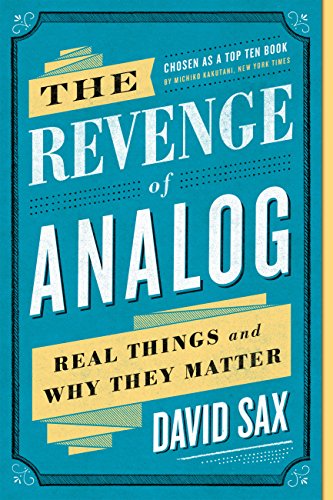Admittedly, I’m a bit late to this book, which was published all the way back in 2016 (it seems so long ago now). But after slowly chipping away at it for a year or so, I’m ready to talk about what I like and what I don’t like about The Revenge of Analog: Real Things and Why They Matter by David Sax.
As a whole, The Revenge of Analog is written to be a bulwark against the digital tidal wave or, at least, against the argument that the digital revolution is here to wipe out the world of analog stuff. If you think that computers and apps will totally consume the physical world, then David Sax is here to tell you to think again. The analog world is fighting back.
Reading through the book, you’ll quickly notice a simple formula. Each chapter takes an analog product, process, or concept that people claim to be dead, dying, or rapidly changing (like brick-and-mortar retail, board games, in-person learning, etc.), then explains why that analog thing is actually doing really well.
This repeating formula is probably why it took me so long to finish this book. It’s easy to put it down after completing a chapter and come back to it a month later. That’s kind of nice, but it also makes it feel like a collection of magazine articles, rather than a book that builds to a larger point. And, in the end, I think Sax fails to make the case that ‘Analog’ has had any sort of revenge against ‘Digital.’
Don’t get me wrong, I love analog stuff. This blog is proof of that. And I think it’s mostly very interesting to read about how companies like Moleskin, which is profiled in this book extensively, are managing to create a thriving business in this analog space. But although the current business of vinyl records and Polaroid cameras are cool, all this analog stuff is still very niche. Apple, on the other hand, has become the most valuable company in the world by doing things like putting a digital camera in every pocket, creating a streaming music service, and selling iPads.
To put it another way, Sax generally glosses over the huge decline of the industries he covers here. And it’s probably a mistake to think as though it’s “digital vs analog” – if society were forced to choose, analog would probably lose at this point. To me, it’s much more interesting how these analog industries can integrate with the digital industries; like book stores hosting virtual book clubs or vinyl records being paired with digital downloads. But that’s just not what this book is about.
In the end, I didn’t dislike The Revenge of Analog. There are some interesting business profiles, anecdotes, and conversations within these pages. I just don’t think it offers much besides that.

